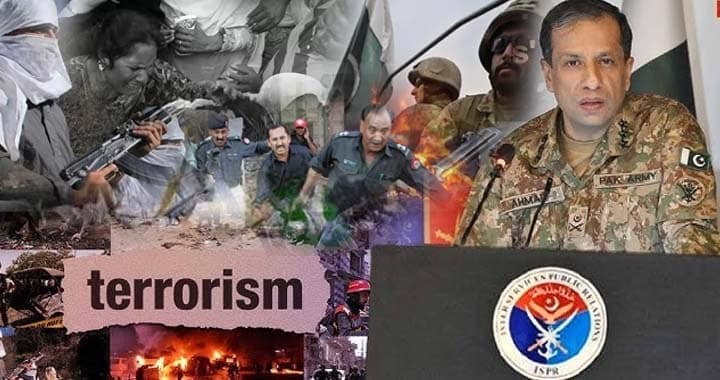Director General ISPR, Lieutenant General Ahmed Sharif Chaudhry, has said that the ongoing wave of terrorism in Pakistan is not just the work of external enemies but is also being sustained by a dangerous nexus involving political and local support. He revealed that the number of foreign militants killed this year is the highest in a decade, and that the surge in terrorist incidents since 2021 is directly linked to failures in policy and political will.
Speaking at a press briefing in Peshawar, the military spokesperson stated that terrorism cannot be rooted out unless the state works hand in hand with the people of Khyber Pakhtunkhwa. He said that under a deliberate and calculated plan, safe havens have been provided to terrorists and their facilitators. “We must now unite with the public to eliminate this menace once and for all,” he stressed.
Lieutenant General Chaudhry also highlighted the regional dimension of the threat, saying that India continues to use Afghanistan as a launching pad for terrorism against Pakistan. But while pointing to external involvement, he made it equally clear that the internal enabling environment, especially the political one, is what allows terrorism to persist.
He asserted that the terrorist nexus is benefiting from both local and political protection, a claim that strikes at the heart of Pakistan’s ongoing struggle to develop a unified national response to the crisis. “Political parties had earlier agreed, under the National Action Plan (NAP), to eliminate terrorism without compromise,” he said. “But the reality is, the previous government deleted several key points from that plan. That lack of implementation is the core reason for the resurgence in terrorism.”
The DG ISPR said that instead of building consensus, politics has been played on the issue of terrorism, leaving the public confused. “Are we really united under one national narrative today?” he asked. “Do we not hear voices even now calling for talks with terrorists?” He warned that romanticising dialogue with those who have spilled innocent blood undermines both military efforts and national morale. “If every issue could be solved by talking, then there would never have been wars,” he added.
He further reminded the press that all political forces had once agreed on the need to sever the link between terrorism and criminality as the only path toward peace. “Unfortunately, misleading narratives have weakened counterterrorism operations. We need clarity, not confusion,” he said.
The military spokesman also pointed to long-standing institutional weaknesses, noting that between 2014 and 2021, various recommendations had been made to strengthen the judicial system to deal with terrorism-related cases. However, implementation has lagged far behind. “We must also strengthen the Counter Terrorism Department (CTD) of the police,” he said, adding that the current manpower is simply not enough to meet the threat.
He concluded his briefing by paying tribute to the police force in Khyber Pakhtunkhwa, especially those in CTD, who continue to make immense sacrifices despite limited resources. “We salute the brave personnel of KP Police. Their courage is not in question, but they must be backed by strong systems and sincere political will.”





